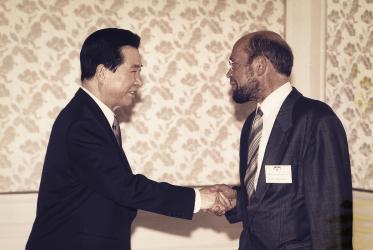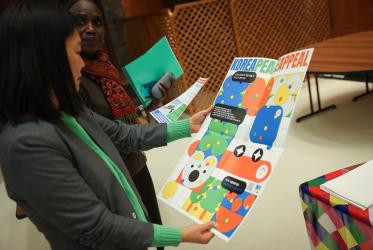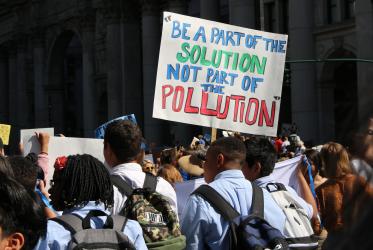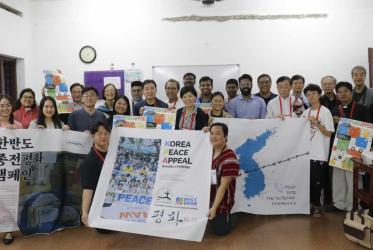In a plenary session on “The Living Fellowship” at the World Council of Churches (WCC) Central Committee meeting on 20 June, the WCC marked achievements from its past 70 years in working for Christian unity and action, and also looked ahead at challenges.
The plenary focused on the Korean Peninsula, the Programme to Combat Racism (PCR), work against nuclear weapons, and Thursdays in Black, the global movement resisting attitudes and practices that permit rape and violence.
Rev. Myong Chol Kang, chairman of Korean Christian Federation in the Democratic People’s Republic of Korea (DPRK, or North Korea), expressed his sincere gratitude and appreciation to the WCC.
“Since the 1984 Tozanso Consultation, the WCC has been engaged in efforts of peace and reunification in the Korean peninsula through contact and cooperation with the Korean Christian Federation and the global ecumenical partners for more than 30 years,” said Kang. “Brothers and sisters, peace has begun to emerge on the Korean peninsula, which has been struggling with nuclear confrontation and war.”
Kang also reflected there is much work left to do to ensure a lasting peace. “The Panmunjom Declaration for Peace, Prosperity and Reunification of the Korean peninsula was adopted by the historic North-South summit, and the joint statement which states the establishment of new DPRK-US relations was adopted at the end of the historic DPRK-US summit,” he said. “The achievement of permanent and well-established peace in the Korean peninsula depends on how we implement the Panmunjom Declaration and the DPRK-US Joint Statement.”
Kang added: “I am enthusiastically appealing to everyone who commits to justice and peace to pray for the success of the Panmunjom Declaration and the DPRK-US Joint Statement. I am also asking you to give active support and encouragement.”
Rev. Hong Jung Lee, general secretary of the National Council of Churches in Korea, expressed joy at the new prospect of peace on the Korean Peninsula.
“Using this opportunity I want to express my heartfelt thanks to all of you here under the umbrella of the WCC and to the great cloud of witnesses in the past years who have sacrificially engaged in the ecumenical accompaniment process for the democratization and peaceful unification of the Korean Peninsula, which are two sides of the same coin in the Korean context,” he said. “This 70-year history of the WCC since 1948 has been closely intermingled with the historical process of the ecumenical accompaniment with the two divided Koreas, also established in 1948.”
Rev. Frank Chikane, moderator of the WCC’s Commission of the Churches on International Affairs, underlined the role of the churches and the importance of the prophetic voice.
The Central Committee also watched excerpts from a video interview in Pretoria, South Africa with Brigalia Bam, one of the women with a key role in the shaping of the ecumenical movement.
Bam’s work at the WCC, from 1967 to 1981, focused on women and the PCR, and she travelled all over the world speaking on these topics and building networks of Christian women. Her ecumenism and profound rejection of racism remained evident throughout her whole career.
Baldwin Sjollema, the first director of the PCR, also made a presentation about how the PCR supported reflection and action among churches in Southern Africa, provided direct humanitarian support to liberation movements, and was a leader in international campaigns for economic disengagement from apartheid.
Sjollema, underlined that “the most important and urgent issue for all of as today is how can we and how should we live together as people of different cultures, different races and different histories.”
Beatrice Fihn, executive director of the International Campaign to Abolish Nuclear Weapons, which won a Nobel Prize in 2017 stated: ”I am a 100% certain that we would not have achieved the Treaty on the Prohibition of Nuclear Weapons or won this prize without support, guidance and commitment to ICAN from partners like WCC.”
WCC moderator Dr Agnes Abuom recalled that, three decades ago, the WCC declared an ecumenical decade of churches in solidarity with women, during which, she said, “we listened carefully to the stories of women subjected to rape and violence due to war, abuse of power, poverty, desperation and oppression at the hands of family, friends, community and religious leaders, bosses, colleagues, and strangers.”
Thursdays in Black grew out of those stories, Abuom explained. “The campaign is an encouragement and tribute to the resistance and resilience of women who refused to accept the violence as inevitable and the perpetrators as beyond the law.”
Learn more about Thursdays in Black
Watch the interview with Brigalia Bam
Address of Baldwin Sjollema, the first director of the PCR
Address of Beatrice Fihn, executive director of the ICAN
High resolution photos from the Central Committee meeting
70 years of the World Council of Churches






